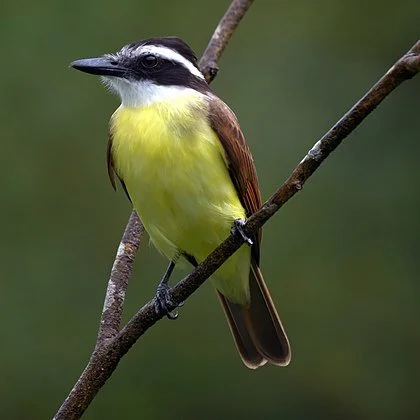Bem-te-vi jogou* gameleira** no chão
Bem-te-vi jogou
Gameleira no chão
Bem-te-vi jogou
Gameleira no chão
Botou, botou
Gameleira no chão
Eu vim botar
Gameleira no chão
Jogou, jogou
Gameleira no chão
Jogou que eu vi
Gameleira no chão
*Bem-ti-vi
This alert and aggressive bird has a strong and manoeuvrable flight, which it uses to good effect when it feels annoyed by raptors. Even much larger birds are attacked by the bem-te-vi, usually by diving down or zooming straight at them while they are in mid-air.
The call is an exuberant BEE-tee-WEE, and the bird has an onomatopoeic name in different languages and countries: In Brazil its popular name is bem-te-vi ("I saw you well")
Bem-te-ve threw the Gameleira to the ground
Bem-te-ve threw
The Gameleira to the ground
Bem-te-ve threw
The Gameleira to the ground
It threw, it threw
The Gameleira to the ground
I came to throw it
The Gameleira to the ground
It threw, it threw
The Gameleira to the ground
It threw, I saw
The Gameleira to the ground
** Gameleira
This tree, also known as the Iroko, is sacred in Candomblé and represents time. It is the essence of creation, the power of the Earth and the sense of life. It is and ancient tree and the principles associated with it were brought to Brazil by enslaved Africans.
The song alludes to a smaller, seemingly weaker person taking down a larger and stronger opponent, reminiscent of the ‘David vs Goliath’ story in the book of Samuel. It can be introduced when a less experienced player catches a more experienced player with a rasteira or cabeçada, for example.



